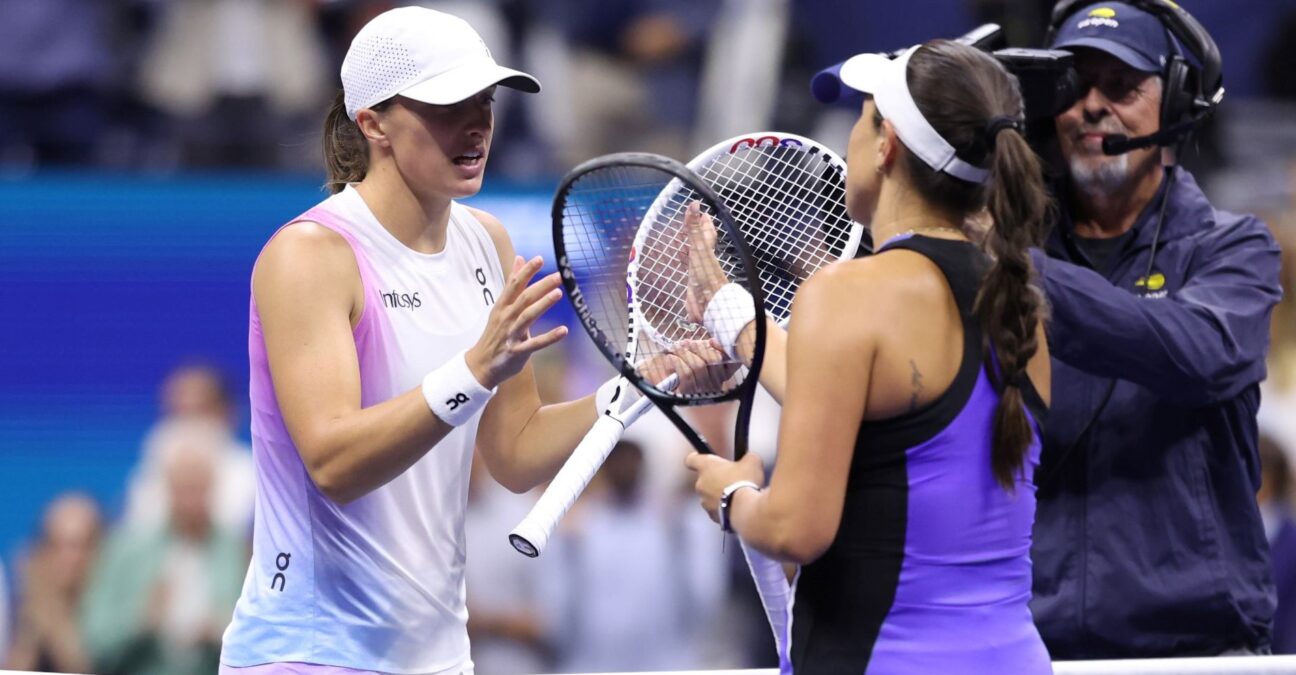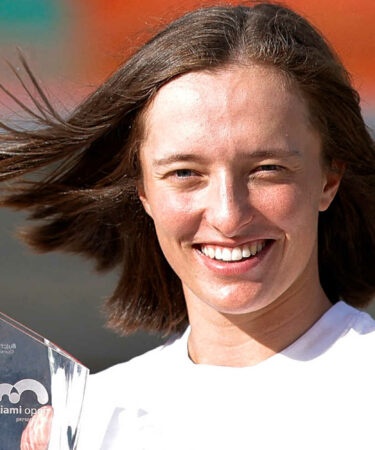Iga Swiatek’s curious Grand Slam record
In 2024, the Pole failed to make it past the quarter-finals of any of the three majors away from her hallowed Roland-Garros turf
 Iga Swiatek loses to Jessica Pegula at the 2024 US Open
Antoine Couvercelle / Panoramic
Iga Swiatek loses to Jessica Pegula at the 2024 US Open
Antoine Couvercelle / Panoramic
Relative to Iga Swiatek‘s stratospheric standards, she has had a somewhat indifferent Grand Slam season across 2024.
While the world No 1 continues to collect Roland-Garros titles at an extraordinary rate, Swiatek’s record in the majors dips considerably away from the clay courts of Paris.
For most, a French Open title would likely form the apex of one’s entire career. Yet since so sensationally claiming her maiden Grand Slam title at Roland-Garros aged just 19, Swiatek has made winning the clay-court major look merely habitual.
Just four years after that stunning victory, the Pole has added another three consecutive Roland-Garros titles to her tally, as well as triumphing at the US Open in 2022.
Five Grand Slam titles at the age of 23 is a phenomenal haul, and Swiatek is just as dominant across the rest of the tour as she is at her favourite major.
That is, apart from the other three Grand Slam tournaments – on current form, at least.
swiatek’s grand slam struggles away from roland-garros
This year, Swiatek exited from both the Australian Open and Wimbledon at the third round, before being comprehensively beaten by Jessica Pegula in this year’s US Open quarter-final.
In fact, when taking Roland-Garros out of the equation, the world No 1’s best results at the other six Grand Slams over the past two years have been two last-eight finishes – with two third-round and fourth-round exits completing the list.
It is important to reiterate here that this is in the context of an otherwise stellar career, one that has seen the Pole sweep a remarkable 22 titles already.
It almost feels churlish to quibble about a lack of success at Grand Slams away from the one that Swiatek reigns over so supremely.
Yet, her dominance over the WTA is so comprehensive, and she has remained so brilliantly consistent since being thrust into the No 1 position two-and-a-half years ago, that Swiatek’s current inability to crack the latter stages at three of the year’s biggest tournaments is undeniably puzzling.
Perhaps such success at Roland-Garros actively hampers Swiatek’s chances at Wimbledon. After all, she said herself that her consistent deep runs in Paris mean she has little or no grass-court preparation heading into the Championships at the All England Club each year.
“For sure it’s a huge challenge,” Swiatek told reporters after winning her fourth Roland-Garros title this spring.
“If I would lose here earlier, maybe I would be able to play two more weeks on grass and then be a better grass player, but if I would choose, I love playing on clay, so I’m not going to give up that ever.
“I felt last year that I could adapt quicker. I’ll also see what the plan is for this year, because last year it was the first time I was able to play this tournament before, you know, I played Bad Homburg.
“So I think to play some matches before Wimbledon is also good, but on the other hand, I played basically almost every match in Stuttgart, Madrid, Rome and here, and so we need to, like, take care of my physicality, as well.”
Related to this is the fact that Swiatek has not yet fully got to grips with grass-court tennis, with her devilish topspin-heavy game blunted by the flatter, quicker conditions on grass. Despite this, the world No 1 still made a valiant run to the quarter-finals at last year’s tournament, falling to an excellent Elina Svitolina in three competitive sets.
early exits for swiatek at the us open and in melbourne
The Australian and US Opens are harder to fathom, however. Swiatek is a formidable hard-court player, as evident in her 11 titles on the surface. Yet, apart from a semi-final berth in Melbourne two seasons ago, and a title-winning run in New York at the end of the same year, Swiatek has struggled to go deep at either of the hard-court majors.
For much of this summer’s US Open, it felt as if the world No 1 was fully in her groove, dispatching difficult opponents with panache en route to the last eight without the drop of a set.
Then came a desperately poor performance against Pegula in the quarter-finals, and another premature departure from Flushing Meadows for a player who anything other than a final or a title is deemed a disappointment.
“It wasn’t a good performance from me,” was Swiatek’s honest summation following defeat.
“Jessie took advantage of it, she played better, I didn’t play as well and she won. I realised something was wrong when I lost 4-0 in the first set, I tried to do the same job as usual.
“I didn’t understand why my service wasn’t working. I had a hard time finding the right solution. It’s never easy to play against Jess, her shot is tricky because it stays quite low and she hits quite flat. She was much stronger than me and made a lot fewer mistakes.
“That’s why she put pressure on me. Usually, I manage to make her back off or put pressure on her, but today I made too many mistakes.”
a short-term issue for problem-solver swiatek?
Having said all of this, perhaps the sample size is simply too small. True, over the past two seasons only Roland-Garros has seen Swiatek progress past the last eight, but if we take another look in two years’ time, the picture could be radically different.
Judging by those bursts of success Swiatek has enjoyed in both New York and Melbourne, these early exits look likely to be only blips along the road to fully adjusting to the unique conditions, feel and atmosphere of each Grand Slam city and tournament.
Swiatek is one of the finest problem solvers in the sport, and it would be fool-hardy to suggest that another US Open title, or a maiden triumph in Australia, will elude her for much longer.
But as another Grand Slam season draws to a close, and Swiatek once again remains without a major semi-final appearance away from Paris, the need to solve this problem sooner rather than later takes on greater importance.
If 2025 reads much the same for Swiatek as her last two years at the majors, a curious early-career anomaly may quickly turn into an unwanted Grand Slam hoodoo.











